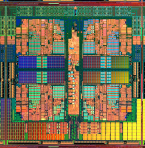A decade of tech - EPIC WINs and a few EPIC FAILs

With 2009 rapidly drawing to a close, here's a quick tour of the tech EPIC WINs that we've seen over the past decade, along with a few EPIC FAILs.
EPIC WINs
Single-core -> Dual-core -> Quad-core

Now we're at the point where for most applications, clock speed isn't an issue any more. In fact, clock-speed is now pretty much irrelevant and even chipmakers don't give this metric the center-stage it once had.
Sony PlayStation 2
Here's the device that bought home gaming to the masses and basically made a generation of gamers realize that you didn't have to change graphics cards each time you bought a new game!
It might now be considered to be a piece of Flintstones tech compared to the latest-generation consoles, but during its time this was the "must-have" gaming platform.
Apple iPod
This first-gen iPod could only sync with Macs. A Windows-compatible iPod that sported the touch-sensitive click-wheel didn't become available until July 2002.
Since launch some 220 million have been sold worldwide and the iPod has changed the way people listen to, and buy, music.
More EPIC WINs -->
Windows XP
Released in 2001, it's still so good that the vast majority of PCs still run it, and users seem to still be very happy with it.
Netbooks
Well, what probably caught the imagination of buyers was the good battery life and the slender price tag.
Amazingly, during the tough economic times, the netbook has help keep the cash rolling in for many of the OEMs.
iPhone
Love it or hate it, the iPhone has made a huge splash.
EPIC FAILs
SLI/Crossfire
The ability to kit out our PCs with two (or more) graphics cards was going to revolutionize the way that we upgraded out systems. The idea was that we'd buy one card, and then at some point down the line a second one, thus harnessing the power of both the old and new card. Problem was that GPU technology moved on so far that it wasn't worth the bother keeping the old card.
Sure, there are a small handful of hardcore gamers willing to buy two or more graphics cards, but most people have more sense.
Windows Vista
However way you want to cut it, Microsoft fumbled the launch of Vista so bad that service packs and cute ads featuring Bill Gates couldn't change the public's opinion that "Vista = Pain."
iTunes software
Windows users didn't get the pleasure of being host to iTunes until the software hit version 4.1, but in that time the software has, in my opinion at any rate, not evolved much beyond being a vehicle for beaming money from your pocket and into Apple's bountiful bank account.
Triple-core
I'm not sure what AMD was thinking about when it introduced a line of triple-core processors. The idea just didn't have the legs to take it very far. The only segment where triple-core caught on was hardcore gamers who found you could mess about in the BIOS and get four cores for the price of three!
One Laptop Per Child
While it could be said that it was the OLPC that kick started netbooks, the failure of the OLPC project to deliver on its aims shows how having an ego-driven endeavor with a PhD at the helm in no way guarantees success.
Feel free to add your own WINs and FAILs.
<< Home >>